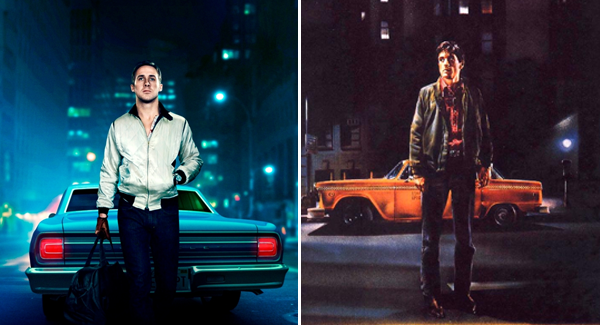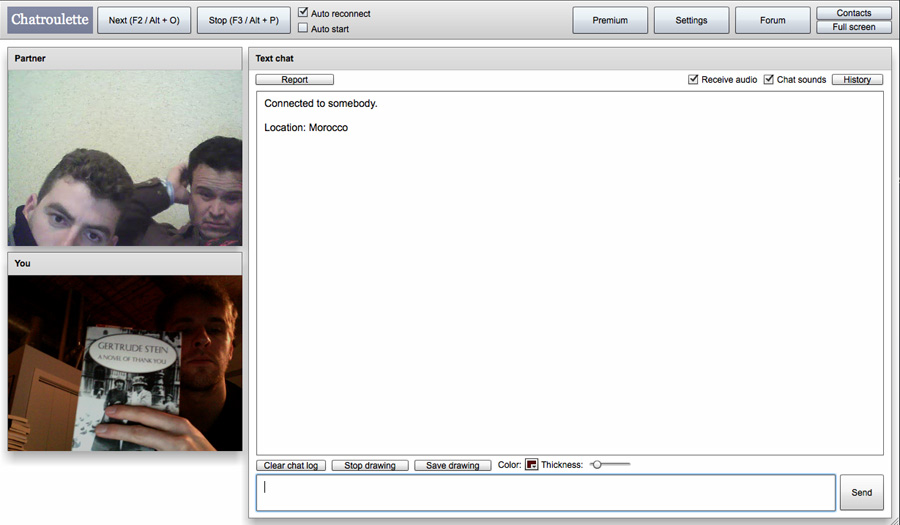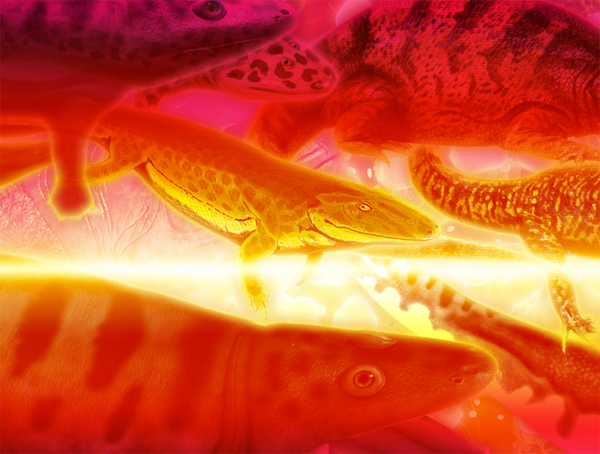“. . . Then submit your finished work to the iBookstore with a few simple steps. And before you know it, you’re a published author.”
Language is the atmospheric anomaly our fingers and tongues make happen
Consider the singing of suspended telephone lines or the vibration of a car antenna at certain mid-gruesome speeds. (A similar aeolian phenomenon is “flutter,” caused by vortices on the leeward side of the wire, distinguished from “gallop” by its high-frequency, low-amplitude motion.) To do so would be synonymous with considering the Kármán vortex street: a term in fluid dynamics for a repeating pattern of swirling vortices caused by the unsteady separation of a fluid’s flow over bluff bodies.

L’invalide du post
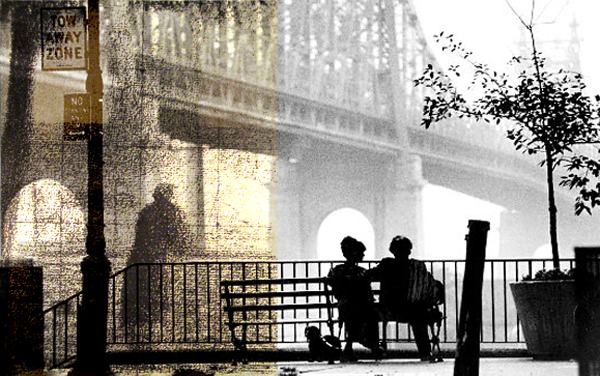
In Manhattan (1979), for about one minute, the characters played by Woody Allen and Diane Keaton sit in front of the Queensboro bridge at dawn after an all night date — both strenuous and romantic it seems, as I’ve never been, though I can imagine the slow light creeping onto someone’s lovely face as bakers and newspaper boys wake up, and cats return to porches with heads. Keaton concludes the scene by saying she has lunch with a friend. In a lesser first attempt, in front of the Brooklyn bridge in Annie Hall (1977), Woody tells Diane in response to if he loves her, “Love is too weak a word. I lurv you, I loave you, I luff you,” the middle sentiment which I always hear as “loathe” because I’m a Nietzsche kind of bro; I appreciate more “The most beautiful words in the English language are not I love you, but It’s benign,” which he says in Deconstructing Harry regarding a tumor. Much of Manhattan is drawn in silhouette, black shapes eclipsing grey backdrops as moons before a muted sun. Artists are always going to a city for the low and high rent and culture, respectively, until that get’s flipped, and they move. Never say “gentrification” at a dinner party, it’s dumb. Paris may in the past, but their bakers’ butter still wafts in the air. In Les Misérables (1862), Jean once passes an “l’invalide du pont” (the invalid of the bridge, here Pont d’Austerlitz), a disabled war veteran given a job collecting toll. Georges Seurat’s, L’invalide (Conté crayon on paper, c. 1881) does not have such a task, but merely gazes across the waters. Most known for his laborious pointillist paintings, I’ve always preferred his studies for them, the brief encounter with form from a meandering hand, as if only loosely attached to the eye. It’s so sad how both the artist and his subject’s aloneless are contingencies for their very collision. I will take anyone who jumps off a bridge seriously. I bet Diane has a salad with a French word in it. I bet Woody had some pills, imagining them as almonds for her salad. If only time could yellow a .jpeg the way it does a drawing. This post should be $2.50, but I’ll let you pass.
If I Falter at the Gallows
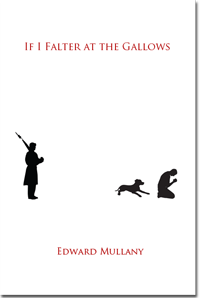 If I Falter at the Gallows
If I Falter at the Gallows
by Edward Mullany
Publishing Genius Press, October 2011
84 pages / $10 Buy from Publishing Genius
Once on Facebook a friend shared the shortest horror story in the world. Just like Facebook, this story involves the awkwardness of when too many people exist in your situation. Maybe let’s say “involves” in the same way somebody says “Hey, Ed, get over here, what do you think?” And Ed tries to say “No, no, I don’t want to get involved.” In any event, the shortest horror story in the world, supposedly, was written by Frederic Brown: “The last man on Earth sat alone in a room. There was a knock on the door.” Note there’s no “then” before “there.” The world is basically the intrusion of the world. This presents the endless and (sure) terrifying awkwardness of simultaneity, which causes me to say I actually think Ed should get involved, if we’re talking terror, and by Ed we’re talking Edward Mullany, author of If I Falter at the Gallows, a book of barely unchoked poems, arrangements of scene and confession that scalpel the world like a goth kid who grew up to be a jeweler.
January 27th, 2012 / 12:00 pm
Book + Beer: John Jodzio + Magic Hat # 9
I do enjoy book as artifact. Funky front matter. Sudorific spine. A peplum on the paper edge, etc. This is something small presses do well. Mythical book as bible. As postcards. As a head shaped box (or a box shaped head?). Sometimes I hold these books, re-hold them, turn them, smell them (like beer, the odor of books simultaneously contains similarities and unique variances), bend them, watch them, pause during my reading and judge, question, critique (sometimes a book gets too cute in its design; this is about words), admire. I really do like when a book is a thing. Ok, let me hit this Magic Hat.
Here is a video of me talking about some of the stories and images I really enjoyed from Get in if You Want to Live. (I am pretty inebriated, so you may not be able to fully understand me. I do slur [though I never once feel compelled to fucking punch someone, now do I?])
Whoa, Magic Hat! I didn’t expect fruity. What is this flavor? A little lavender and pumpkin pie, a smidgen of doughnut, or is that musk? A hint of buttered popcorn vanilla peppermint cheese pizza roasting meat cinnamon buns strawberry parsley green apple rose Oriental spice baby powder chocolate pink grapefruit cranberry. Just a hint. Interesting. Let me try another one. That first bottle reminded me of the time I went horse-dancing in Mexico. (The riders are usually drunk, the horses are always beautiful, the music is deafeningly loud. All four legs move in time to the beat.)
Amen
Richard Beck: “5.4: Pitchfork, 1995–present,” in the forthcoming n+1.
You know what Pitchfork has always most reminded me of? Ain’t It Cool News.
kiddies, need 2 steal a paper on Moby Dick?? u can have mine 4 free!!!

The Multivalent God of Moby Dick
by you!!! <3
Herman Melville’s complex renderings of god convey the influence of a dichotomous religious upbringing. On Melville’s mother’s side was the Dutch Calvinist church, with its focus on man’s sins and damnation. From his father, he gleaned the more liberal values of Transcendentalism and Unitarianism: a faith in man’s essential goodness.1 “We incline to think that God cannot explain his own secrets,” he wrote to Nathaniel Hawthorne in 1854, “and that He would like a little information upon certain points himself. We mortals astonish Him as much as He us.”2 In Moby Dick (1851), Melville employs multiple symbols, including the ocean and the whale, to illustrate a god in flux. God is portrayed as an entity, which, like the whale, is not completely visible or knowable to man in its entirety. God’s existence, the shape it takes, depends on the perspective of the human who perceives it. Each character’s view of god is molded by his own innate attitude or constitution, as well as the external events of his life. In turn, a weave is created, wherein god and man are both contributors to the shape of a man’s destiny, as well as his perspective of a supreme being.
First Word
I have a longstanding interest in comics. There was a long period where I wanted more than anything to make a great online experimental comic. I still want to make comics, actually, but as an artist I am debilitatingly neurotic. I delete everything I draw on the computer, trash everything I draw on paper. I spend a lot of time wishing that I knew an artist who would like to work with me and make a lot of money. (I am overconfident in this regard, perhaps.)
Patrick Farley was one of many inspirations. His work has regularly bumped up against the limits of current technology. The results were sometimes awkward and even garish, but they were also sometimes incredible, and they always felt like a glimpse into the future of the form. His new comic First Word is perhaps the first time I’ve read something by Farley and felt that it was doing exactly what it meant to do. The technology, and Farley’s ability to manipulate it, has caught up, and there are several truly breathtaking sequences. I guess I should mention that it’s NSFW, unless you work somewhere awesome.
I’ll admit I’m not always entirely clear on what’s going on — the comic is wordless — but there comes a point where that really stops mattering. Curious what you all think of this.

